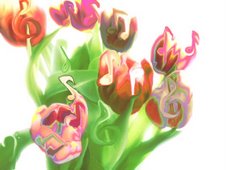Recently, I've been taking a psychology of music class. Be mindful that these excerpts are copyrighted materials. Here are some of my writings from this class:
New York State requires all students to complete one semester of music to graduate from high school. What is to be done with the large numbers of non-musicians that are tossed into the music classroom? There are a myriad of options. In years past, when the Music Education as Aesthetic Education movement was in full swing, these students were made to listen to recordings, and learn about the 'elements of music', and a little history. Some schools in more recent years have adopted a Praxial approach in which students engage in making music. One thing that is commonly excepted is that musical expretise takes practice, and implicitly, a long time. It would be difficult to achieve a high level of musicianship in one semester (of course that may not be the goal). How can large numbers of students create or make music in a way that they deem aesthetically pleasing in a relatively short amount of time? Part of the answer lies in the use of technology....
In the past twenty or so years there has been a digital revolution. The ways in which people process and disseminate information have changed dramatically. Research shows that people who have grown up with this technology, and are native to it, think in ways that are different than those digital immigrants who have not. There have been recent developments in terms of affordable hardware, and sophisticated software that readily allow those that have previously considered themselves nonmusicians to make music...
Students who are in school now are in a unique position because they have been born into the age of the digital revelution. There are certain characteristics of learners who have been born into this era, and those who have not. The learning of music in this era should reflect the technology and the modes of learning to which these students have grown acustomed. Furthermore, the years of music theory, and verbal/linguisitc learning previoulsly considered a prerequisite to making music have been diminished, if not overcome, by developments in music technology. This recent technology combined with student's enculutrated musical knowledge, and their educational bias as natives of the digital era suggest it is time for music educators to reevaluate their methedologly.
Subscribe to:
Post Comments (Atom)


No comments:
Post a Comment